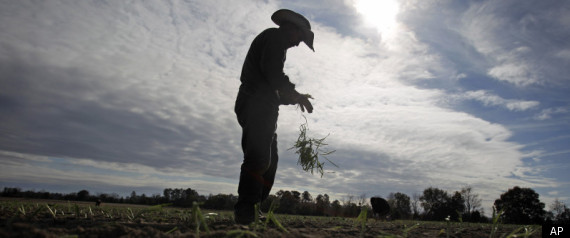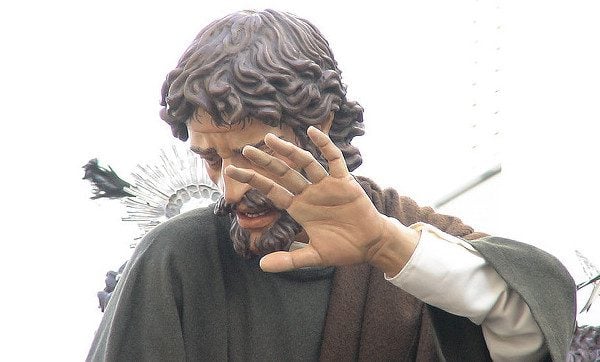
This is the third part in an ongoing series of retellings of the Parable of the Good Samaritan. Read Part 1: The God Samaritan and Part 2: The Wrong Samaritan.
The preacher had chosen a rather appropriate text this morning, the lawmaker thought, seeing how fruits and vegetables growing on farms across the state were rotting in the fields rather than being picked.
“The harvest is plentiful, but the farmworkers are few; therefore, ask the Lord of the harvest to send out farmworkers into his harvest.”
To be honest, it worried the lawmaker. This was a beloved teacher — his favorite really. He had been looking forward to his biannual message here at the Baptist church. Usually they stirred the congregation to renew their faith and the church — the lawmaker included — would find their souls warmed just in hearing his voice, as lost sheep might a shepherd’s call.
 But this message struck a bit too close to the bone, and the lawmaker wondered whether this sermon was meant as a direct criticism of his most recent accomplishment, a work that he had authored and pushed for. And he knew everyone in that huge sanctuary was wondering the same thing, wondering whether all that congratulating they had offered him on his success was now being called into question.
But this message struck a bit too close to the bone, and the lawmaker wondered whether this sermon was meant as a direct criticism of his most recent accomplishment, a work that he had authored and pushed for. And he knew everyone in that huge sanctuary was wondering the same thing, wondering whether all that congratulating they had offered him on his success was now being called into question.
Finally, the lawmaker could not stand it any longer and interrupted the sermon, hoping to get the preacher back on more comfortable ground, more faithful ground really than this bleeding-heart mess about empty fields and lost workers.
“Teacher, excuse me for interrupting,” the lawmaker said. “But this isn’t the kind of message I’m accustomed to hearing from you, and I have my doubts about whether it’s really biblical. So let’s get back to the basics. What must I do to inherit eternal life?”
“Ah yes. Is that you, senator? Yes, well good morning, senator, you’ve been busy lately, I see,” the preacher replied. “You are a learned man, so why don’t you tell us. What is written in the Bible? What do you read there.”
The senator answered, “You shall love the Lord your God with all your heart, and with all your soul, and with all your strength, and with all your mind; and your neighbor as yourself.
“Exactly,” the preacher said. “Do this and you will live.”
But wanting to justify himself, the lawmaker pressed the preacher for clarification, “And just who exactly is my neighbor?”
The preacher smiled broadly. “I’m so glad you asked,” he said. “I’d like to tell you a story to answer your question and see if that makes things a bit clearer.
 “You see, there was once an important lawmaker and he was going down to Montgomery from Gardendale to argue for an important bill he had sponsored because a vote on it was imminent. But on his way, he fell into the hands of robbers, who stripped him, beat him, and went away, leaving him half dead. Now, by chance, another lawmaker was heading to Montgomery along the same route. But, when he saw the beaten man, he cringed at the condition of him and continued on, so as not to be late for the vote. He didn’t even recognize his colleague whose bill he was going to vote on. Next, a pastor came upon him. He, too, was traveling to Montgomery, where he had been given the honor of offering the invocation to bless the senators’ deliberations and decisions there. The pastor approached the wounded man, offered his condolences and promised to pray for him at the session. His thoughts had turned so heavenward that the pastor failed to see that the wounded man was an important senator who had authored the bill up for debate.
“You see, there was once an important lawmaker and he was going down to Montgomery from Gardendale to argue for an important bill he had sponsored because a vote on it was imminent. But on his way, he fell into the hands of robbers, who stripped him, beat him, and went away, leaving him half dead. Now, by chance, another lawmaker was heading to Montgomery along the same route. But, when he saw the beaten man, he cringed at the condition of him and continued on, so as not to be late for the vote. He didn’t even recognize his colleague whose bill he was going to vote on. Next, a pastor came upon him. He, too, was traveling to Montgomery, where he had been given the honor of offering the invocation to bless the senators’ deliberations and decisions there. The pastor approached the wounded man, offered his condolences and promised to pray for him at the session. His thoughts had turned so heavenward that the pastor failed to see that the wounded man was an important senator who had authored the bill up for debate.
But then a Latino man, hands, brow and clothes filthy from a day picking in the fields, approached the senator. When he saw the beaten man, the farmworker was moved with pity. He went to him and bandaged the man’s wounds. Then he carried him to his old Ford pick-up truck and took him to a hospital. “Take care of him,” the farmworker told a nurse, handing her his information. “This is where you can find me if he needs anything at all. And when I come back, I will repay you whatever more his care costs.”
“You are coming back to pay his medical bills? But don’t you know who this man is, señor?” the nurse replied.
“I know him,” the farmworker said. “Of course, I know him.”
The teacher turned to the lawmaker and asked him, “Which of these three, do you think, was a neighbor to the man who fell into the hands of the robbers?”
The senator replied with confidence, “The one who showed him mercy.”
“Exactly so,” the preacher said.
The senator sat down, satisfied.
“But my story is not over,” the preacher continued turning to the congregation.
 “While the senator was recuperating, his bill passed and was signed into law. After several weeks passed, the farmworker returned to the hospital with his entire savings. It was money he had put away in hopes of bringing his family — his wife and three children — to America from Mexico. He used every last penny, but paid the senator’s medical bills. When he had finished, and his receipt had been printed, the farmworker turned to walk out of the hospital.
“While the senator was recuperating, his bill passed and was signed into law. After several weeks passed, the farmworker returned to the hospital with his entire savings. It was money he had put away in hopes of bringing his family — his wife and three children — to America from Mexico. He used every last penny, but paid the senator’s medical bills. When he had finished, and his receipt had been printed, the farmworker turned to walk out of the hospital.
“But when he exited the building, he saw two police officers waiting for him. Under the authority of a new law, he was questioned, detained, and taken into custody for being in the country illegally. Three stories above, from the window of his hospital room, the senator watched, satisfied that justice was done and that he had made it happen. Within a few weeks, the farmworker had been deported to Mexico, penniless.
“So, we see,” the teacher concluded, “that indeed the harvest is plentiful, but the workers are few.”











